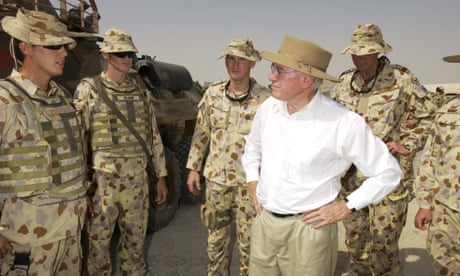- by foxnews
- 04 Feb 2025
After John Howard took Australia to war in Iraq, he was scarcely held to account. Instead, he was re-elected
After John Howard took Australia to war in Iraq, he was scarcely held to account. Instead, he was re-elected
- by theguardian
- 19 Mar 2023
- in news

In the countdown to what history illustrates was, post-9/11, an all but inevitable US-driven invasion of Iraq on 20 March 2003, the public Howard message had three distinct elements: first, Saddam was a proponent of anti-western terrorism and he likely had WMDs; second, Australians were targets of radical jihadi terrorism as evidenced by the Bali nightclub bombings of October 2002 which killed 88 countrymen and -women and a potential threat like Saddam had to be checked, and third, that Australia had given no firm signal to the US Bush administration that it would definitely participate in the invasion.
The claims about the tubes made the dossier, bolstering the case against Saddam on the grounds of his possession of WMDs. In the UK, long after Tony Blair had left the prime ministership, the Chilcot inquiry exposed the mendacity permeating the dossier and the intelligence used to justify invasion.
In March 2004 an Australian parliamentary inquiry concluded that, based on the knowledge of Australian intelligence agencies, there was no compelling case for war against Iraq. Although, as Tom Hyland wrote last year, the Australian media scarcely held Howard to account over this. The caravan moved on to his re-election.
An intelligence misinterpretation? Wilfully misconstrued intelligence? Either way, it added up to an intelligence failure compounded by deliberate political opacity on three continents.
Australian officials certainly were privy to the torture at Abu Ghraib. When as much was reported several times, the government denied it. In the end the government blamed the defence department and the Australian military for what it put down to a communication failure.
Instructively, when coalition forces largely pulled out of Afghanistan (at one point only one Australian defence force member remained in Afghanistan in 2003) to focus on Iraq, the Taliban returned in force.
In his political memoir, Lazarus Rising, Howard lambasted critics of the war and, while making it plain that he at least believed the (faulty) intelligence that Iraq had WMDs, it is startlingly evident that sentimentality towards the US-Australia historical relationship, and alliance-maintenance, was at least as critical.
- by foxnews
- descember 09, 2016
Travelers flock to top religious landmarks deemed 'most Instagrammable'
Travelers visiting religious landmarks across the world may see a photo opportunity that's worthy to share on social media. Here are 10 popular spots, plus some attractions in the U.S.
read more


